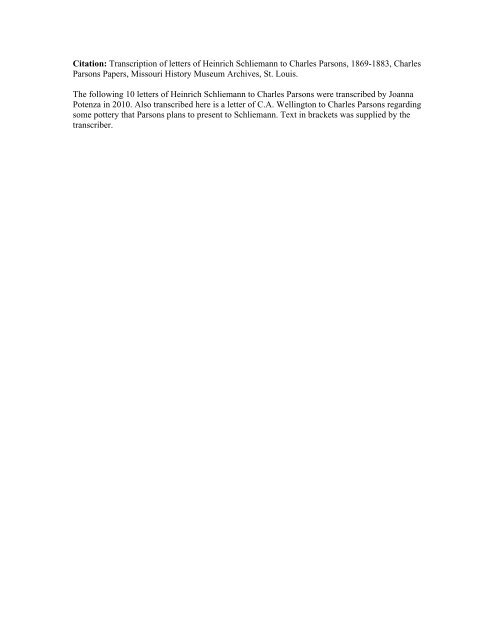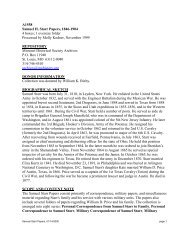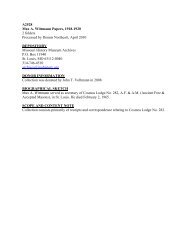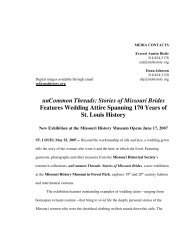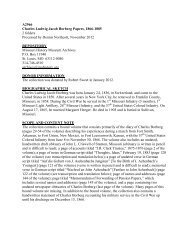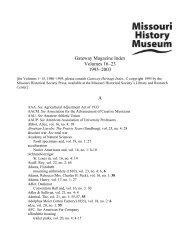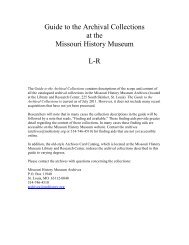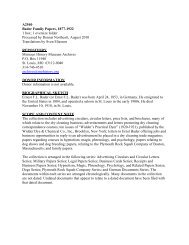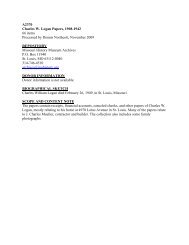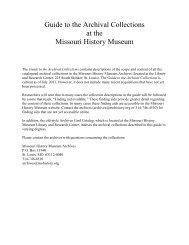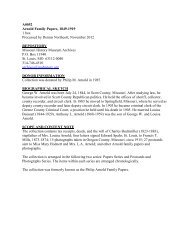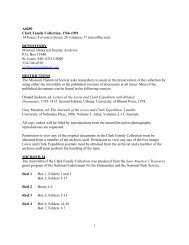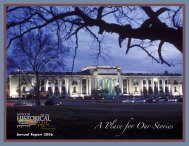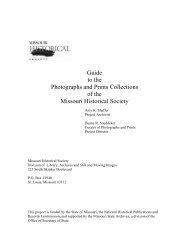Heinrich Schliemann Letters - Missouri History Museum
Heinrich Schliemann Letters - Missouri History Museum
Heinrich Schliemann Letters - Missouri History Museum
You also want an ePaper? Increase the reach of your titles
YUMPU automatically turns print PDFs into web optimized ePapers that Google loves.
Citation: Transcription of letters of <strong>Heinrich</strong> <strong>Schliemann</strong> to Charles Parsons, 1869-1883, Charles<br />
Parsons Papers, <strong>Missouri</strong> <strong>History</strong> <strong>Museum</strong> Archives, St. Louis.<br />
The following 10 letters of <strong>Heinrich</strong> <strong>Schliemann</strong> to Charles Parsons were transcribed by Joanna<br />
Potenza in 2010. Also transcribed here is a letter of C.A. Wellington to Charles Parsons regarding<br />
some pottery that Parsons plans to present to <strong>Schliemann</strong>. Text in brackets was supplied by the<br />
transcriber.
Indianapolis, Ind. 10th May 1869<br />
My dear Mr. Parsons!<br />
I had very great pleasure in receiving your very kind letter of 6th inst, for which please accept the<br />
expression of my sincerest gratitude.<br />
I see now that I have no chance of finishing the affair, for which I am here, before the middle of<br />
June next, but, if nothing prevents me, I shall then avail myself with joy of your kind invitation to<br />
go and see you at St Louis. But as I have a great deal of baggage with me I would trouble you too<br />
much and thus I beg you will grant me the permission to stay at the Southern Hotel; I promise to<br />
remain never, theless a whole day with you at your house.<br />
I am delighted to hear that both your good Lady and her sister are quite well and happy. I write<br />
today to my editor W.C. Reinwald in Paris to send you a second copy of my book; the first copy<br />
has miscarried, but since I have now given your exact address I have no doubt that you will<br />
receive the book promptly. It has been printed at Paris in french and at Leipsick in german. I<br />
suppose you are more familiar with the french and therefore send you a french copy. I should like<br />
to send also a copy to your sister in law. Is not her name Mrs Euphrosia Macquay? I am only<br />
afraid it will be a very dry lecture to you all, for it only treats of archaeology and was principally<br />
intended to procure me the degree of a doctor of philology. For this purpose I sent it, together<br />
with two thesises- one in ancient greek and one in latin – to a german university and I am already<br />
informed that I shall have the doctorate this month.<br />
I trust you and your good Lady will soon follow the wise example of General Donaldson and<br />
retire to the “ville par excellence” to the wonderful Paris.<br />
Please accept my hearty thanks for your kind endeavors to find out what has become of the<br />
missing Edw. Thibaut-Brignolles. Already your mere statement that there were 3 generals Stuart<br />
from Tennessee in the Southern army proves to me your superior tact and knowledge. I had also<br />
addressed myself to General Beauregard, whose acquaintance I had made in Decbr 1867 in New<br />
Orleans, but, strange to say, he wrote me back that neither he himself nor any of his numerous<br />
friends whom he had questioned knew or heard of any other General Stuart than the two who<br />
served under him (General Beauregard) in Virginia and Tennessee and who were both without<br />
families.<br />
At the suggestion of a party here I had also written to Colonel John T. L. Preston of Lexington,<br />
Virginia, who answered me two days ago, that there has been in the western army a Lieut genl<br />
Alexander I. Stewart, who has commanded a corps and that he is now a professor of mathematics<br />
in the Cumberland University, Lebanon, Tenn and that he has a grown daughter, whose name is<br />
perhaps Maggie and two grown sons; further that he has a brother, a school-teacher in Memphis,<br />
whose name is John D. Stewart. There certainly appears to be some amount of coincidence<br />
between these statements and those of the missing Edw Thibault Brignolles and I therefore wrote<br />
at once to the Professor of mathematics in the Cumberland University and to his brother the<br />
school-teacher in Memphis, but I am afraid that if they are not the parties in question they will not<br />
answer me at all. Besides the Colonel did not give me the address of Mr. John D. Stewart, the<br />
schoolmaster and further there is a great difference in the names Stewart and Stuart! But I have<br />
no doubt that with your valuable assistance I shall succeed in ascertaining the fate of the missing<br />
young friend.
I was much gratified to see from your circular the particulars of your Banking Establishment,<br />
which, under your wise management, cannot fail to grow rapidly in wealth and importance.<br />
In thanking you once more most cordially for your amiable cooperation to find out the fate of the<br />
missing man and in heartily reciprocating your kind wishes, I remain in expectation of your<br />
further interesting communications,<br />
your faithful friend<br />
Hy <strong>Schliemann</strong>
Indianapolis, Ind 16 May, 1869<br />
Chas Parsons Esq St Louis<br />
My dear Sir!<br />
I duly received your esteemed favor of 7th inst, as also Mr Silas Bent’s address upon the<br />
Theometric Gateways to the Pole, which I have read with immense interest. If you have a taste<br />
for scientific pursuits, as for instance the Northpole question, then I guaranty to you that you can<br />
never feel tedious if you make Paris your home. The opinions emitted by said Mr Bent perfectly<br />
agree with those of Mr Lambert of the Polytechnical institution of Paris, who had raised some<br />
funds by public subscription, had bought a vessel and was going to start for the North-pole by<br />
way of the Behring’s Straits. But the amount he collected falls short of 200000 francs, whereas, in<br />
my opinion, at least three times as much is required to do the thing well. Unfortunately, in spite of<br />
his profound knowledge, he has not had tact of enough to insinuate himself with the french<br />
minister of the Marine, who considers him a visionary man and refuses therefore all and every<br />
assistance on the part of the French government. The emperor gave him fr 50/m from his private<br />
purse and nearly the whole rest of the money he has got was subscribed by us, members of the<br />
parisian geographical society. Though the route this expedition takes is in my opinion the only<br />
one by which men can ever succeed to get to the Northpole, and though Mr Lambert is no doubt<br />
the most clever man that ever tried to clear up the mysteries of the arctic world, yet his attempts<br />
will be frustrated in the very beginning for want of the most necessary, and his expedition is<br />
therefore of no account.<br />
But if such a scheme fails in France, where 999 out of a 1000 have more taste to see “Hamlet”<br />
than they have to know the exact statistics of the Pole, it could not possibly fail in the U.S., where<br />
useful knowledge goes beyond every other consideration and where every one seems to be born<br />
with a passion for geography. The only thing would be to start the thing in a serious manner and<br />
to get some great american geographer at the head. I would joyfully contribute myself. Please<br />
speak with Mr Silas Bent how such an expedition might best be got up in this our great country,<br />
which is more entitled than any other to the glory to have reached the Pole. Pray, ask Mr S. Bent<br />
also by what arctic exploration our fellow-citizen Dr Isaac J. Hayes has gained this year’s great<br />
golden medal of the Parisian geographical society? I saw a notice of it the other day in the paper;<br />
but I do not know of any recent expedition of Dr. Hayes!?<br />
Pray, accept my warmest thanks for having sent me Mr Silas Bent’s address.<br />
General Alex P. Stewart, now professor of mathematics at the Cambridge University, Lebanon<br />
Tenn, answered me very kindly, that he knows nothing of Edw Thibaut-Brignolles, that he has no<br />
daughter nor niece, nor any female relative of the name of Maggie or Marguerite and that he does<br />
not know of any confederate general officers of the name of Stuart or Stewart, except General<br />
J.E.B. Stuart of Va, who was killed and who had no family.<br />
In consequence of the advertisements I inserted in the Oswego (N.Y.) Advertiser, I received a<br />
long letter from a certain Mr. Charles Rhodes of that city, who enquired about Edw Thibaut-<br />
Brignolles, saying that he had employed the young man in 1864 for a considerable time in his<br />
railway office, that he left him in spring 1864 and returned in summer of 1865 with a discharge of<br />
the Union army, but without money or change of clothes. He (Mr Rhodes) took him again into his<br />
office and employed him until November, when the young man suddenly decamped, without<br />
saying a word to any body. On seeing him take away his things from the office Mr Rhodes<br />
thought that he was merely removing them to some other place. But soon after he had left he
found out that he had disappeared altogether. At first he thought that he had been done away with;<br />
but on learning that he had also taken away all his things from the boarding house he became<br />
satisfied that he had left by the Railway. He adds that nothing occurred there that would permit<br />
any reason for his leaving in that sudden manner, but that he looked so depressed ever since his<br />
return from the South; he further writes that he made or proposed to make at Oswego<br />
arrangements to manufacture toilet-soap.<br />
But all this is perfectly different of the accounts the young man gave to his father in 1865 from<br />
Oswego, viz that he had been married end of 1864 in N.Y., that he had left this bounty of $900<br />
with his wife, passed his examination in the engeneer corps, became a lieutenant and left as<br />
Captain with a ball in his leg; that after the war, in summer 1865, he was engeneer in the Pic. Ho<br />
mines in Pennsylvania, where he lived with his wife and economized in 4 months some thousand<br />
dollars; that he came with this money, in company of his wife, who had never touched his bounty<br />
of $900, to Oswego, where the [he] started a fabric of soap and candles, which went on in such a<br />
successful way that he invited his father to live with them and even offered to pay his passage<br />
out.<br />
I think, there can be no doubt but the young man has been mentally deranged and has<br />
communicated to his father mere visions but no things that really existed. No doubt he has got,<br />
end of 1864, ensnared in N.Y. by some damsel of equivocal character, who styled herself<br />
daughter to General Stuart and, who, under promise of marriage, pushed him to enlist in the<br />
Northern army and to leave her his bounty. I venture to declare it a falsehood that that young<br />
man, whom I considered in St. Petersburg unfit for any serious mental occupation, should, with<br />
his superficial knowledge have been able to pass his examination in an U.S. engineer corps and<br />
leave some 5 months later as Captain; of this and of the ball-wound Mr Rhodes would have made<br />
mention if it had been true.<br />
I declare it likewise a fable that he should have worked as engeneer in the mines of Pic. Ho, for<br />
he had no more knowledge of engeneering than a cow has of a Sunday; it is a fable also that he<br />
should have come from said mines with thousands of dollars, in company of his wife, to Oswego,<br />
for he came there immediately after the close of the war penniless and without change of clothes.<br />
Had he come there with his wife Mr Rhodes would have mentioned it. No doubt if the damsel has<br />
really married him, of which I doubt, then she has certainly left him to his fate as soon as she got<br />
possession of his soldier’s reward. Mr Rhodes mentions nothing of the fabric of soap and candles<br />
and merely says that he arranged or proposed to arrange for manufacturing toilet-soap.<br />
After the young man’s sudden departure from Oswego, as mentioned by Mr Rhodes, he has<br />
written 2 letters to his father from N.Y. informing him in his last letter, of March 1866, that he<br />
was going to Memphis, armed with pistols the roads being unsafe. I suppose that, instead of going<br />
to Memphis with pistols, he went with only one pistol to some place in the neighborhood of N.Y.<br />
to commit suicide.<br />
I have communicated at once to Mr Rhodes of Oswego my opinion of Edw Thibaut-Brignolles’<br />
doings and fate and I will send you a copy of his answer. Meanwhile I beg you a thousand<br />
pardons for having given you so much trouble; with great gratitude I shall refund you in St Louis<br />
whatever expenses you may have had in the matter. But ere we drop the matter, pray, consult<br />
your memory and inform me what battles General Sherman has fought in 1865?<br />
Mr Edw Thibaut-Brignolles who can impossibly have entered the army before January 1865 and<br />
still he wrote to his father that he had made nearly the whole campaign of Gen Sherman and that<br />
he had taken an active part in the battles of from Macon to Savannah and thence to Charleston;
that he had been engaged in the battle of Petersburg and in the encounters at Richmond. Should<br />
all this have been possible in the 6 mths which the war lasted in 1865?<br />
Once more I beg you will accept my warmest thanks for your readiness to serve me and my<br />
excuses for having troubled you so much. Always most happy to serve you in return I remain<br />
yours very faithfully<br />
Hy <strong>Schliemann</strong>
Indianapolis 18th June 1869.<br />
My dear Mr Parsons!<br />
I am very much obliged to you for your kind lines of 15th inst and would with great joy accept<br />
your friendly invitation for next week if I could. But I cannot get on with my business here so<br />
promptly as I expected. I should like to see it terminated before I leave this city even for one day.<br />
I have no doubt that I shall succeed in the first half of July and my first excursion will be to St<br />
Louis. In my present state of mind I would be a tedious companion and annoy you all.<br />
Any of your friends whom you want me to see, will, with a line from your hand, find a good<br />
reception at my house in Paris.<br />
When at St Louis I shall try to prevail on you to accompany me to N.Y. and to assist with me at<br />
the great Convention of American Philologists to be held on the 27th July and the 4 days<br />
following. Eight highly important questions regarding the system of our american colleges and<br />
the method of teaching the ancient and modern languages are being discussed there. I have<br />
already sent there a long dissertation on those questions, for I believed that I should not be able to<br />
attend the assembly; but now my desire to be present is paramount.<br />
I have given on 10th May order to my editor at Paris to send you a copy of my last work and so I<br />
trust you will have got it by this time.<br />
I am happy to see that you and your good Lady are doing well and return your friendly greetings<br />
with cordiality.<br />
Here one third of the population is now suffering from chills and fever, but I hope not to get sick,<br />
for I take early in the morning some quinine as a preservative.<br />
I also have but little hope that they will apply to you for the reward regarding Brignolles; but in<br />
case it might happen, I refund you the money from here with gratitude.<br />
I remain faithfully<br />
your friend<br />
Hy <strong>Schliemann</strong>
Athens 3 Decbr 1874<br />
My dear friends<br />
It is highly gratifying to me to see from your kind letter of 21st Oct that you have not only not<br />
forgotten your fellow-traveller, but that you have always received with interest the accounts of his<br />
explorations and rejoiced at his success. Your appreciation of my work is the greatest recompense<br />
I could wish for and it encourages me to continue the excavations with the utmost vigour as soon<br />
as my dispute with Turkey is amicably arranged, which I trust will be the case in the course of a<br />
fortnight. The Turkish minister had taken ill my remarks on page LII-LV of the preface of my<br />
book and has brought here in the beginning of April last a suit against me to revendicate one half<br />
of my whole Trojan collection. He had engaged the 3 most powerful lawyers and brought it so far<br />
that I have been obliged in May last to make the whole collection of 25000 objects suddenly and<br />
mysteriously disappear in order to save it. I have been immensily annoyed by the suit. Seeing<br />
now that I am fully a match to him and that he cannot recover anything at all of the collection, he<br />
wishes to negotiate and with $4000 cash and the continuation of the excavations for the exclusive<br />
benefit of the Turks for 3 or 4 months I shall no doubt settle the matter very shortly. But the suit<br />
has already cost $8000. However, large as these expenses are, they are but trifling as compared to<br />
the value of the collection, for not only it derives from the city, the mere name of which makes all<br />
hearts bound with joy, but it belongs to that remote antiquity, which we, vaguely groping in the<br />
twilight of an uncertified past, call the heroic or prehistoric age. I joyfully continue the<br />
excavations even without taking anything of what may be discovered, for I am afraid some<br />
government may step forward and continue the work, in which case all my gigantic trenches<br />
would at once be filled up.<br />
I am now married to a young Athenian who fully shares my enthusiasm for Homer and assists me<br />
in my works. We have a daughter Andromache; had a boy but he died. Mrs <strong>Schliemann</strong> shall be<br />
most delighted to see you at Athens. But, pray, in passing through Paris enquire with my agent<br />
Mr Beaurain 25 Chausée d’Antin where we are, for we are both disgusted here. Ever since my<br />
discoveries have become known I have been libelled here by the envious scholars and during all<br />
the time the suit has lasted the Greek government has brought its crushing influence on the Courts<br />
in order to get the decisions against me. Thus I have had to fight all the time with my 6 lawyers<br />
against 2 governments. In consequence of that we shall henceforward again live in Paris, or<br />
perhaps in Naples; but first we have to finish Troy, where we cannot begin before 1 March.<br />
Perhaps you can come and see us there.<br />
I have been sorry to hear of Mr Parson’s sick hand, but I hope that it is long since convalescent.<br />
I shall at all times be most delighted to hear of your good health and prosperity. Pray, inform me<br />
in your next also how Mrs Parson’s sister is; my kindest regards to you all.<br />
In England there is also a great enthusiasm for Troy. According to the Times Mr John Murray has<br />
at a dinner on the 13th ult sold 800 copies of my work which he has published in an English dress<br />
with engravings.<br />
Believe me my dear friends<br />
yours most faithfully<br />
Hy <strong>Schliemann</strong><br />
Charles Parsons Esq St Louis
Athens 18th Jany 1877<br />
My Dear Mrs Parsons<br />
I just received from the postoffice your most interesting letter of 20th ult, from which I am very<br />
proud to see that you still remember me and that you so highly appreciate my labours. But to my<br />
immense regret I am unable to send you any souvenir at all from Mycenae, because, as you will<br />
have seen from the London Times of 3d inst, I have presented to the Greek nation the one half of<br />
the treasures, which I could have claimed by the law, and I assure you on my honour that I have<br />
not even kept the slightest particle of the gold for myself. Regarding the other collection, it<br />
belongs to the state, Mycenae being national property, and the Greeks are so jealous of me that<br />
the Archaeological Society here refuses even to let me have 100 common Mycenaean potsherds<br />
out of the millions of beautiful fragments and thousands of splendid vases which I have gathered<br />
for them at the risk of my life and with large expenditure.<br />
[Remainder of letter is cut off.]
Paris 26th April 1878<br />
5 Boulevart St Michel<br />
My dear Mr Parsons<br />
Please accept my warmest thanks for your kind letter of the 21st ult as well as for the window<br />
shutter, which has already arrived at London and will at once be forwarded to Athens. I shall be at<br />
Athens by the end of May, and after having examined the shutter with my architect I shall take<br />
the liberty to inform you of the exact number of shutters I require. The freight on this sample<br />
shutter amounts to more than the costing price, but I trust you can procure very cheap freights for<br />
a large parcel. I shall give you all particulars from Athens.<br />
I shall have to return this summer to London, and shall then have much pleasure in giving to<br />
Messrs Smith Payne & Smith some little reminiscence from Troy for you. I have nothing from<br />
Mycenae myself; all my treasures are in the National <strong>Museum</strong> at Athens and belong to Greece.<br />
Mrs <strong>Schliemann</strong>, who joins me in kindest regards to you, Mrs Parsons and Mrs Mackay, has been<br />
delivered here of a boy, who has got the name Agamemnon,<br />
[Portion of letter is cut out.]<br />
In recrossing the<br />
Alps a fortnight hence<br />
I shall remember the great<br />
pleasure I enjoyed 10 years ago<br />
in your and your ladies charming company<br />
on our trip from Chambery to Susa
Paris 14th June 1878<br />
5 Boulevart St: Michel<br />
My dear Mr Parsons<br />
I just returned from Athens, and have the immense regret to inform you that the sample-shutter,<br />
which you kindly sent me, is certainly not fit for a mansion of that character as I am building.<br />
You will see it your self when you and Mrs Parsons come to see us at Athens. I have not the<br />
slightest doubt but your artist could, if he saw the edifice, make the inner shutters of perfectly the<br />
form and solidity required. But, to give exact instructions in that respect, is, with the distance<br />
which separates us, quite out of the question.<br />
I am exceedingly sorry to have troubled you, and write Messrs Scribner Armstrong & Co in New<br />
York to send you a copy of Mycenae, which, pray, accept in kind remembrance of your fellow<br />
traveler across the Alps in 1868.<br />
With kindest regards to you, Mrs Parsons and Mrs Macquay<br />
yours very truly<br />
Hy <strong>Schliemann</strong>
[Handwritten note:] -Only Representative of the Low Art tiles-<br />
[Text of letterhead:] Household Art Rooms,<br />
No. 171 Tremont Street.<br />
C.A. Wellington,<br />
Importer of Paving and Art Tiles.<br />
Original designs furnished and contracts solicited for Tile work in Churches,<br />
Banks and Public Buildings.<br />
A Specialty of Antiques, Pottery, Rare Prints and Books.<br />
Household Furniture From Special Designs.<br />
Foreign Selections Made in Person Every Year.<br />
Boston Sep. 15th 1879<br />
Charles Parsons Esq.<br />
Dear Sir;<br />
We were directed by Mr. Kayes to send you the two pcs. [pieces] of pottery we showed you, they<br />
will be sent as carefully packed as is possible to the same, tomorrow, as was agreed (on yr part)<br />
by Mr. Keyes, -- which is but just, -- We should expect you to pay for the risk of breakage in case<br />
such an event should happen by the carelessness of Ex. Either going or coming here. We<br />
guarantee the genuineness of the pcs.[?] and will send the little mummy on also if desired with<br />
the pcs. [pieces] of mummy cloth still on it, which you may remember. We received the pottery<br />
from a gentleman now in Paris; we have sold a few pcs. [pieces] to the Art <strong>Museum</strong> of this city &<br />
the (Agassiz) [word crossed out here] “<strong>Museum</strong> of Comparative Zoology” at Cambridge, you can<br />
present them to the illustrious Dr. <strong>Schliemann</strong> with nothing but a sure feeling of their<br />
authenticity. The price of the pcs. [pieces] is $15.00 each.<br />
Very truly yours,<br />
C.A. Wellington
Athens: February 9th 1882<br />
My Dear Mr Parsons<br />
I have hailed with very great joy your letter of the 2nd inst. As well as the splendid volume you<br />
sent me, and which Mrs <strong>Schliemann</strong> and I will read with the very greatest interest. In fact nothing<br />
could be more flattering to me than to see that you still so kindly remember your fellow traveller<br />
across the Mont Cenis in May 1868. To use reciprocity I send you a copy of my two last works<br />
Orchomenos and Journey in the Troas. I would have sent you also a copy of my Ilios if I did not<br />
feel sure that you already possess it.<br />
With very great pleasure I have heard from American travellers of your growing prosperity; but<br />
with your iron will and the steadiness of your capacious mind that was of course to be expected. I<br />
think with a sigh of the happy time when I met you 14 years ago, for I had then but recently<br />
retired from commerce and had a great deal of leisure, whilst now I am continually overwhelmed<br />
with literary work and the older I become the more the burden which presses me becomes more<br />
heavy onerous. When you receive this letter I have again long since recommenced the exploration<br />
of ancient Troy, which bids fair to retain me on the shore of the Hellespont until August. It would<br />
be a great joy to Mrs <strong>Schliemann</strong> and us if you would honor us with your excellent Lady, either at<br />
Troy or here at Athens with your visit. In both places you will find a very warm welcome. My<br />
address at Troy is “D.H. <strong>Schliemann</strong>, Troy Near the Dardanelles.” After this year’s Trojan<br />
campaign we shall probably have to stay for two or three months at Paris to work up the French<br />
edition of Ilios, which is to appear before the end of the year with Firmin Didot & Co. at Paris.<br />
Next winter we have an idea to do the Nile.<br />
With heartiest wishes and kindest regards to you your good Lady and Mrs Mackay I remain truly<br />
your friend.<br />
Hy <strong>Schliemann</strong>
Troy near the Dardanelles 17th June 1882<br />
My dear Mr Parsons,<br />
I read here your welcome letter of the 18th April and see from your remark that you possess “Troy<br />
and it Remains”, but not my last child Ilios, of which I have great desire to present you a copy.<br />
Should you happen to be in Europe you may perhaps take it with you from Mr Murray on your<br />
return. Otherwise please direct him how to send it.<br />
You express the wish to be engaged in something that while giving you pleasure would confer<br />
benefit on the world. I can indeed propose you something which would render your name<br />
immortal and confer an immense benefit on the world; namely to excavate the great artificial<br />
mounds in the land of Goshen in Egypt and thus to bring light into the dark night of the history of<br />
the Jews before their emigration from Egypt.<br />
If you will do it I shall probably excavate the mounds of the first Greek settlements in Egypt; but<br />
if you will not operate in Goshen I may do it myself; I shall, of course, not do it conjointly with<br />
you for if you do the work you must have all the glory of it. Mr Maspero, the director general of<br />
Egyptian Antiquities, as well as the American Consulate Cairo would give you all possible<br />
advise.<br />
Mrs <strong>Schliemann</strong>, who works here with me, joins me in kindest regards to you Mrs Parsons and<br />
Mrs Mackay<br />
yours very truly<br />
Hy <strong>Schliemann</strong>
Athens: November 25, 1883<br />
My dear Mr Parsons,<br />
Mrs <strong>Schliemann</strong> and I we have had the very greatest pleasure in receiving your kind letter of<br />
October 14th with your amiable Lady’s photograph to which we allot a place of honour in our<br />
album. I rejoice to see that a long time of fiteen and a half years have not brought on the slightest<br />
change in her appearance; in fact she looks now younger than in fall 1868, when I had last the<br />
good luck to meet you at Paris.<br />
We are delighted to see that you had been pleased with Mrs <strong>Schliemann</strong>’s photograph as well as<br />
with that of our house at which you both a standing invitation. We are much grieved to hear that<br />
Mrs Mackay has had the misfortune to sprain her ankle and has for six months been unable to<br />
walk. But it is a great consolation to us to think that with her enthusiasm for literature she will at<br />
least not have had time to feel tedious. We are very glad to learn that she is now quite well again.<br />
It has given me great pleasure to see that you have been pleased with my Ilios.<br />
With kindest regards of Mrs <strong>Schliemann</strong> and myself to you, Mrs Parsons and Mrs Mackay, I<br />
remain,<br />
very truly yours<br />
Hy <strong>Schliemann</strong><br />
I am now busy with the French editions of Ilios but as soon as that is finished I hope to explore<br />
Crete.


